Camp Closure Without Viable Plan Challenges for Internally Displaced Persons (IDPs) from Northern Shan State and Man Win Gyi area in Kachin State
Topics
Regions
Much news out of Myanmar these days is about how the war being waged by the military junta against people’s resistance since the coup is causing massive displacement of the population. According to UNOCHA, to date nearly 1 million people have been displaced by conflict since the start of the military coup last February 2021. The situation is devastating, and amidst and within this ongoing horror, it would be easy to overlook the many horrors and tragedies currently unfolding.
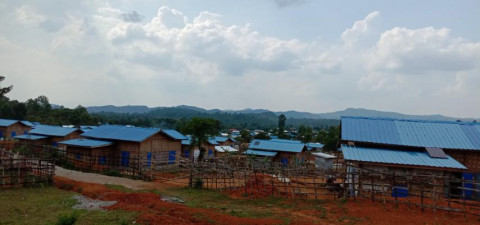
NSS-IDP
Download
One especially urgent and terrible human drama now unfolding demands attention. In northern Shan State, about 14,000 people currently living in IDP camps who were previously displaced by armed conflict even before 2021 – most of them as much as 10 years ago – are now being threatened in a new way. Despite the intensification of armed conflict since the coup, the northern Shan IDPs are being told that the IDP camps will be closed down by the end of this year (and some even earlier) and that they must depart. No viable plan, no discussion: just an order to prepare to leave.
Armed conflict is what originally forced them to flee their customary lands and to settle into IDP camps so many years ago. They remain there because the conflict situation never improved substantially enough for them to leave, and indeed has deteriorated even more since the coup. Where is the logic in forcing any IDP camp to close down today? Where are the people who live in these camps supposed to go today? For sure, some people – military authorities, aid professionals etc. – will have something to say. But what about those most affected: what do the northern Shan IDPs themselves have to say?
In this commentary the people who were displaced a decade ago speak to us in their own words. We ought to listen to the IDPs’ words closely, rather than imagining that others know what is best today.
The IDPs in northern Shan State point to the ongoing conflict situation and argue that conditions needed for their safe and dignified return do not exist. They point to meetings that are taking place in preparation for forcible camp closures – meetings from which they are being excluded -- and argue that after ten years of being away from their customary lands and villages, much has changed and much has been destroyed by the military occupation. This means that careful planning and preparation are necessary to be able to “rebuild a safe and secure” physical and social environment for them and their children. They argue that any discussion of closing the camps must include them sincerely and meaningfully, because every decision made will affect them directly.
Surely, their practical experience and no-nonsense knowledge of their own situation in the camps and the situation on the ground is what should guide the actions of anyone who would want to help them in this hour of need. Listening to them, the warnings are clear: closing the camps in the manner that is being threatened is dangerous folly and will have tragic consequences. If anyone wants to help them, what they need is good preparation and planning, safe and secure places to go (whether original villages or elsewhere), and support for basic food and medicines. Their recommendations are not only reasonable and humane, but they are also actually the right thing to do according to the most basic international human rights and humanitarian principles.
“We Have No Place to Go”
Current Challenges for IDPs in Northern Shan State and Man Win Gyi area in Kachin State
Briefing by Internally Displaced Persons (IDP) Committee from northern Shan State and Man Win Gyi area in Kachin State (NSS-IDP)
During 2011-2012, many of us ethnic people in northern Shan State had to leave behind our homes and villages to seek shelter due to the outbreak of intense armed conflicts in our areas. We have been suffering a lot as a result of this. Since the outbreak of Covid-19 in Myanmar in 2020, and the political crisis in February 2021, our situation has worsened even further. At the moment we are facing an imminent threat to close our camps, without any proper place to go and little help to resettle us.
Currently there are 30 IDP camps in seven different zones in northern Shan State. These zones are located in Kutkai, Nam Kham, Muse, Mongko, Man Tong and Namtu Townships in northern Shan State and Mansi Township (Man Win Gyi area) in Kachin State. Some of these camps are located close to Kachin State as well as the border with China. The IDP camps contain some 2,800 households with a total population of 14,000 people, according the NSS-IDP Committee list of August 2021. These include ethnic Kachin, Shan, Ta’ang, Lisu and Chinese.
Under the current conditions, we cannot go back to our villages for several reasons. Forcing IDP camps to close is like destroying our lives. Like we are being attacked from all sides.
How we have been surviving
We IDPs are facing extreme hardships to survive due to compounding factors over time. These include: decreasing food aid; restrictions imposed on migrant work due to COVID-19 pandemic; rising commodity prices; and mobility restrictions due to continuing armed conflicts in our areas; and the impact of the political crisis.
The main support for us IDPs has come from religious organizations and relevant ethnic literature and culture associations. Our IDP camps are usually located on the lands owned by them. However, in some IDP camps in Man Win Gyi and Mongko zones people collectively pay to rent the land for the camp. We have also received support from civil society organizations and international non-governmental and humanitarian organizations, as well as from the Ministry of Social Welfare and Resettlement. But after the political crisis in 2021, all basic assistance has been interrupted.
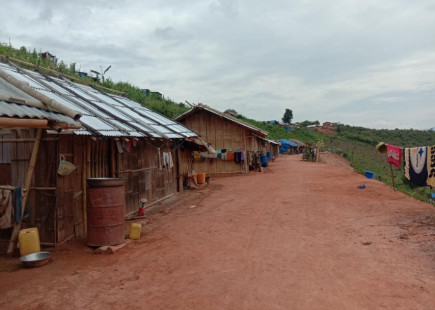
NSS-IDP
At the same time, commodity prices have risen sharply, and sources of income and job opportunities in the area have become rare. As a result, our families face many difficulties for our daily survival. Some of our IDP households try to make some income by collecting forest products, such as traditional herbs, bamboo, firewood, and by hunting animals. But those who do this also have to face the landmine risk and security threats.
Before the Covid-19 pandemic, some of us worked as migrant labourers in the Chinese border area as well as in other places within the country. There were many wage labourers in the camp, and people could seek work in nearby places. But currently, work opportunities are very rare. For example, we used to help grow and cut sugarcane when the season came, and would go to work in the fields to harvest paddy. But now most of us are jobless.
To be able to migrate for work, people have to take loans with interest from others to pay for transportation and middlemen fees. In the past, many of us used to go to China for work. But after Covid-19 happened and the roads were closed, many could not come back and many could not go there either. Some could not even come back for their parent’s funeral. They are also worried that if they come back and cannot get a job here in Shan State, they might not be able to go back to China again. Now, young IDPs are trying to seek work in the Kokang and Wa regions and in Muse.
We are also very much worried for the education of our children. Some of them had to start working outside the camps even before the official working age. We are worried that their future will be lost because they could not go to school at the appropriate age, and have to live in the crowded living situation in the camp, and to endure the hardship faced by our families. Parents cannot afford to send their children to school anymore when they reach the middle grade. As a result, many become young migrant workers in other parts of the country to earn money for the family livelihood, mostly in northern Shan State. There are many armed groups active around the camp area, so IDPs are worried that young people will be recruited by them as soldiers.
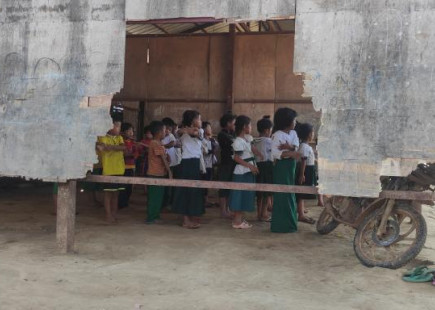
Children at school at Man Win Gyi RC1 camp, Mansi Township
Over time, we IDPs feel accused by outsiders, and we feel mentally attacked. For example, some of them think that IDPs don’t want to return to our villages because they think IDPs receive full support for living from others, and that IDPs are only relying on outside support. We wish people could live in our shoes for just once and experience how it really is. Now, the majority of the camps do not receive any support. Only a few camps receive support for basic food of between 12,500 to 25,000 kyats [about 4-8 USD] according to age per month from an international organisation. How do we feed ourselves when all the prices are so high now?
If only the situation improves and we can see a clear return plan with guarantees for our safety, then we would just want to go back to our villages. Because those places are our homes, we can make a living and support ourselves well there. We can do what we want. Because now we live in the camps, we face pressures from different sides. We are not staying here because we don’t want to go back.
The right to land
We have been living in these IDP camps for 10 years already. Some of our original villages and places have turned into forests and there is also no security yet to enable us to resettle there. Many IDPs went back to look at their former villages, to see what has happened to their lands. There are only a very few who went back to try to work on their former village lands, in times of more relative stability. But when the harvest time came and the area became embroiled in another armed conflict again, they had to give up their crops. After facing such a situation repeatedly, most IDPs dare not to go back.
Also, the distance between the IDP camps and their former villages is more than a daytrip. There are many armed organizations along the route and the security condition is fragile, and there are transportation difficulties and mobility restrictions. Some IDPs have asked for permission to return to their original places from the armed organizations, but were refused due to security reasons. Indeed, there are many armed organizations stationed around our villages and the situation is quite volatile and armed clashes can occur anytime.
Different armed units are also permanently stationed in and around some of our IDP villages. And they stay in some of our houses that we have left behind. They have destroyed some of our other houses and taken away wooden posts to build their barracks. In some villages, there are temporary military encampments.
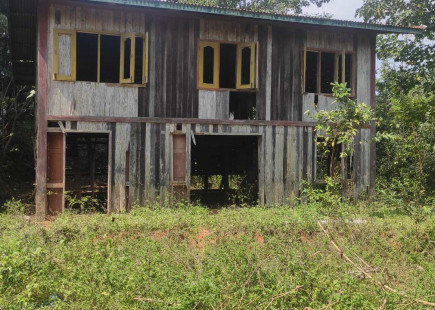
NSS-IDP
Even under these conditions, many of us have a strong desire to go back to our home villages. But since we do not know when we can return, and while we are facing increasing pressure to leave our IDP camps very soon, those of us who can afford it are forced to try to buy land nearby the IDP camps with our hard-earned money. But this can be done only by a few households, and some borrow money with interest to do so. IDPs buy land from the locals who are willing to sell their ancestral lands. We don’t buy land that falls within the protected forest area or that are occupied by other people. Actually, IDPs are not buying land because they have surplus money. There are many camps where the IDPs living there cannot return to their former places. For example, some of our villages of origin burned down during the fighting, so we have to find a new place to stay. But we can only buy small plots of land for housing, and it is not enough to build houses or to rebuild our livelihoods.
Some of the donors (NGOs/INGOs) and UN organizations have some misunderstanding towards us. On the one hand, we hear that they think because we can buy land, we do not face many difficulties, and that they don’t need to support us with basic food items anymore. This scenario is actually happening. We hear many misunderstandings. On the other hand, we understand there may be difficulties faced by these organizations as well.
In some camps, IDPs cannot buy land on their own. In those places, local churches or local organizations try to arrange places for them to resettle. Local communities, culture and literature associations, and faith-based organizations together explore how to arrange land plots for us. For example, for one of the IDP camps in Kutkai township, the KDA ceasefire Kachin armed group provided their forest area as living space for IDPs. It is like building a new village. We have received legal documents for this. Although IDPs can live there for generations, we cannot sell those lands. If we do not want to live there, we have to just leave the land.
Another example is in Nam Hpa Ka Zone in Kutkai Township. Here the local church has been supporting an IDP camp with around 60 households. When the IDPs presented the need for land, a number of local people donated some land to the church. The church then allocated a little more than 5 acres to resettle all the 60 households on, in exchange for a donation of 600,000 MMK per household. We have saved money for three years, from 2020 until 2022, to pay this amount. The church also helped to provide ownership documents from the government to us. In 2022, we received these with the signature from Nam Hpa Ka administrative officer, and we also informed the General Administrative Department (GAD) office. We have also applied to the government land survey office. After getting all the necessary documents, they came to measure the land in our place. We have also sent all the documents needed to an international organisation to help support us with building houses. Now, the progress has stalled at that stage. We have assigned six families who don’t have young children going to school to stay in that place as a guard.
After buying land, there are other challenges. Right now the most complicated situation is faced by the Man Wing Gyi Zone in Mansi Township, which has six IDP camps, out of which only two are recognised by the government as IDP camps. The largest ethnic group living around this area are Shan people, and there are also Kachin people, and some of the local community sold their land to IDPs for them to resettle. In order to purchase this land, these IDPs had to do migrant work for 4-5 years to save up the money. But after these IDPs bought land and applied for formal documents, some other local people in the area started to object to this plan, because it seems they do not want new people to settle there.
International aid organizations told us that if we cannot show them the documents for the land we purchase, they cannot support us to build our houses or to get public amenities such as water and electricity. So we started to apply for these documents. But to do so, we need to go through bureaucratic channels of the authorities and many times we faced difficulties. Here, people usually buy and sell land under customary practices. No one tries to get formal documents, land registration or form 105. We also presented these issues to these international humanitarian organizations. We requested them to accept the agreement document made between buyer, seller and village leaders that is part of our customary system. The condition that they can only support IDPs building houses if there is formal land ownership document is not working at all for us. We have never made these kind of documents since our ancestors’ time. It is just inviting more problems. Requiring such formal documents is also creating more conflicts between the local communities and IDPs.
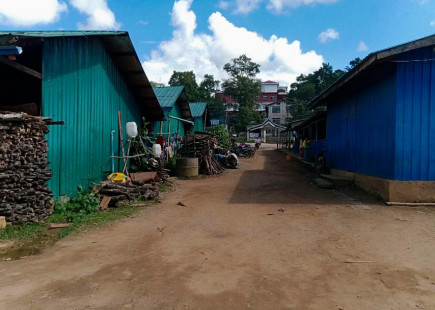
NSS-IDP
In each camp, there is an IDP land management committee. Because there are many villages living together in one IDP camp, it becomes necessary to work on land issues by the respective village themselves. So, village-level committees have been formed. It is necessary to systematically document and record the number of villages and land facts per village. We already have these committees, but we still need clear plans and skills to do this. Due to insecurity, we cannot go back to our villages to collect data and do land mapping activities.
Pressure to close the IDP camps
Pressure from the government to close the IDP camps in northern Shan State first took place during 2018-2019. But from mid-2022 the situation became more serious, as the General Administrative Department (GAD) called IDP camp managers to their offices and told them they would close down the IDP camps by the end of the year. But they have not initiated any proper rehabilitation program to support our return process.
The Township GAD office called for meetings with the IDP camp committees and asked just three questions. They asked whether we return to our villages; or we move on our own arrangement; or we move to a new place. By our own arrangement means living with relatives from another place.
Among us IDPs, there are three perspectives on this:
1) Under the current situation, we do not want to go back. Due to the current political situation and the security situation, no one knows when we can go back. Even if we go back, it is very uncertain if we can rebuild a secure social environment and how long it will take. So, we want to build a new life in the place we currently stay. So we want to work and earn money to buy land.
2) Some of us just want to return back to our villages. We cannot afford to buy land in the current places. Even if we can buy land, we do not have land to grow crops. In the original villages, we have land plots to grow crops and other resources.
3) Those of us who are in between option 1 and 2.
Due to the current political crisis in the country and the escalating armed conflicts in our areas, it is not possible for us to return back to our original villages. Without guarantees for our security and with no proper plan for resettlement and rehabilitation, how can we go back to our villages?
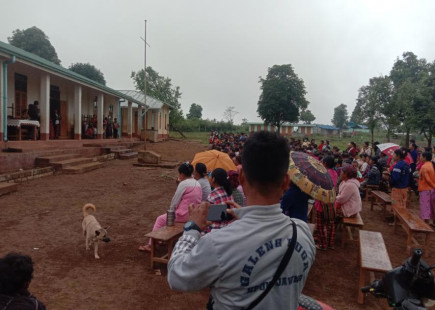
NSS-IDP
Security is one of the key foundations for our resettlement and rehabilitation process. Only when our villages have become peaceful, do we want to return back to our former homes and natural environment.
Another important matter is our customary land – the land we had to leave behind when we were displaced. It is important for us to regain access to those lands. Some of us have never been able to go back to our left-behind lands due to several reasons, including continuing conflict and the presence of landmines, but also because some of us lived far away from the IDP camps, and transportation is expensive, and there are several checkpoints along the way.
Moreover, it is necessary to be mindful of the fact that our needs can vary from camp to camp. For example, in some camps, there are small land plots available for food garden, while in some other camps which are settled in a small space, the rows of our shelters are tightly located next to each other and those of us based there have to live under very crowded conditions. Some of us are facing chronic water shortages while others need basic sanitary services. We are also worried for our children’s education as well as for their health care. As job opportunities and income sources lessen, external assistance has also been dwindling. Some of the IDP camps have been hit by heavy artillery and aerial bombings due to intensified armed conflict nearby us. Under this situation, we are facing increasing pressure to leave the camps.
There are committees to work on the IPD issues led by GAD. But IDPs are not included in these committees. They would discuss IDP related issues and make decision by themselves. The data that they use and activities implemented are not similar to what IDPs have discussed or need. The Kutkai township committee lists two IDP representatives. But their names are included without their consent. When the meetings are held, those two people are not invited. Only their names are there.
Representatives of that committee in Namtu Township said that they will close down the three camps there the latest by October. Now the war has resumed in the Namtu Township, so they have postponed the deadline. But we don’t know until when they will extend it.
In Kutkai Township representatives from the government department dealing with natural disasters said they will pilot the closing process with the five camps there. The people from those five camps have been provided with plots of land and built houses with the help of religious as well as literature and culture associations. For those kind of places, they will stop using the IDP camp names and not recognize these anymore, but people can continue to stay there. Camp closure or not, the IDPs there have requested for a 3-year plan to rehabilitate their lives.
In Nam Kham Township representatives from the same government department have told the IDPs there they would shut down the three camps there by 2023 March. They told the IDPs to start preparing for this process. Since the NLD government time, they told us to look for land ourselves and said they would discuss this with NGOs and INGOs to support for other needs, and also link us with them.
While it has been already challenging to address many social and economic difficulties we are facing, we are yet again bombarded with another pressure from the authorities to leave our camps very soon. If the camp will be forcibly closed down, where can we go?
Recommendations
We have had to leave our villages and lands in northern Shan State since a decade ago. We are facing extreme challenges to return, resettle, and rehabilitate in our villages of origin. Among these, security concerns are the most important factor. Only if there are no more armed conflicts and peace is restored in our places, would we like to return and resettle back home. When the time is right for this, we want to build a secure and safe social environment. Before that time, we do not want to go back. We don’t have a school or a clinic in our village, and our houses, land and properties, and livestock are all destroyed. We need to rehabilitate all those things and receive remedies.
Are there return, resettlement and rehabilitation plans for the IDPs? We wonder who is responsible, and who needs to take accountability? We think that a clear rehabilitation plan and activities should be developed with us IDPs. This is necessary for us to return to our home villages in safe and dignified way.
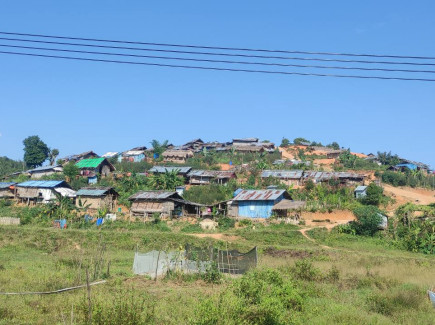
NSS-IDP
After 10 years of leaving behind our homes, social service provisions relating to education, health, social, and economic have broken down in the villages where we come from. It is necessary to rebuild a safe and secure social environment there. In order for us to resettle back, there needs to be at least a clear and detailed rehabilitation 3-year plan. During this time, we cannot return to our villages of origin. While this is the case, we want to remain in the camps under a safe social environment. It is also necessary that we receive sufficient basic necessities such as water, electricity, and shelter. Now this is not the case. We really need more support to fulfill our basic needs.
Assistance has been provided by international humanitarian organizations to us IDPs. But this could not bring effective change. If they have more funds, they will give more help. If they have less, they will give less help. We experience the trend like that. These organizations also have their own criteria. They have many of them. Only if we can fulfill those criteria, we can get help. But we have not become IDPs to fit into those criteria. We ran because we were threatened for our lives. But they could help only if those criteria are met, and that’s why we can see gap and weakness in the delivery of aid. They need to set criteria that are appropriate and relevant to the local situations.
If it is not possible to return back to our original villages, there should be a land area for relocation to provide space for housings, basic necessities, public transportation, and a safe social environment. There should also be at least a three-year plan for social, economic, health and education assistance. When armed conflict in the original area ceases, IDPs should have the right to go back to our villages of origin and access our lands as before.
There should be no pressure imposed on the IDPs relating to the matters for return, resettlement and relocation. There should be support so that we can make decisions for ourselves. For example, awareness raising workshops, giving decision making roles.
There should be extensive discussions with IDP camp committees and IDPs’ own representatives in the matters of resettlement and rehabilitation plans. Every decision affects our lives so we need to take part in these discussions and the decision-making process. IDPs’ voices and decisions need to be heard and respected.
Activities that are supposed to be supporting IDP rehabilitation need to be adaptable to the needs of IDPs.
Whether we are forced to resettle to another place or not at the moment, we maintain our rights to our houses and lands in our villages of origin.
Urgent Needs
- Stop the pressurizing for camp closure without a proper and long-term resettlement and rehabilitation plan.
- Develop plans with the IDPs to set sufficient time and come up with appropriate resettlement and rehabilitation activities.
- Ensure safe and secure resettlement places for the IDPs.
- Support basic items, such as food and medicines for the IDPs effectively.